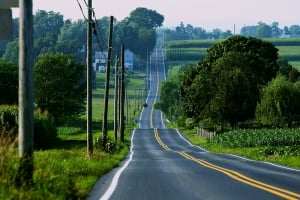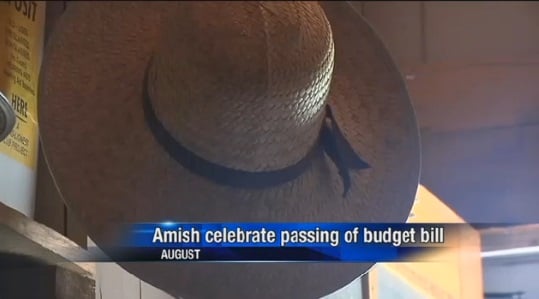Amishman Arrested For Driving Buggy While Intoxicated
An Amishman was arrested for DUI in Kentucky after sideswiping a car with his buggy last week. The 34-year-old man was traveling with his wife and seven children, ages 9 months to 12 years old. He faces 10 felony counts as a result.
The man first attempted to claim that one of his children was driving, but the children confirmed it was their father holding the reins. This incident occurred in Smiths Grove (Warren County), which is in the vicinity of Bowling Green (not to be confused with the Bowling Green, Missouri settlement).

Driving a buggy while intoxicated is against the law in Kentucky. DUI laws vary by state, but operating a horse-drawn vehicle seems to be against the law in most places.
In this WNKY story, the local county attorney however notes that “a motorized vehicle offense carries greater penalties than an non-motorized vehicle offense” (btw, the terms DWI and DUI are used interchangeably in Kentucky).
Amish, Buggies & Alcohol
The fact that this is an Amish person driving while drunk might surprise some readers, but this is hardly the first time it’s happened. It’s usually teens and youth involved, but some Amish areas have reputations for alcohol abuse. The large Adams County, Indiana community is the one that comes first to mind.
I have not experienced it firsthand, as it’s not a settlement that I know well personally. But I have learned from those who do know the community, that hard alcohol consumption is a part of the culture there, and not just among the youth. Last time I was in Adams County, I observed that a local liquor store had ample buggy hitching rail space.
Generally speaking, alcohol is something you see more often in the plainer Amish groups. Smith’s Grove is a Swartzentruber Amish settlement of three church districts.

This story is a mirror of sorts to the tragic crash earlier this month, in which a 21-year-old intoxicated driver struck an Amish buggy with his motor vehicle, killing three children. The much lower speeds of horse-drawn travel and the smaller weight of the buggy would make this less of a danger than operating a two-ton motor vehicle at 50+ mph, but it still carries a danger.
I would suspect driving a horse-drawn carriage after drinking might just be part of the culture in some Amish places where alcohol use is prevalent, under the logic of “it’s just a horse-and-buggy and we’re not going faster than 10 mph so what could happen.” Swerving in front of oncoming traffic, or making an ill-timed turn, can just as easily lead to a tragic outcome however. This man was fortunate that no one was injured.
The fact is that just like non-Amish, some Amish abuse alcohol too. One question that arises is how aware are individuals in these communities that driving a buggy while drunk is illegal and that it carries a danger. I have not heard of an intoxicated Amish driver causing a serious accident, but it might just be a matter of time.






Judge Not
Amish are not without sin. No use judging them as such. I would imagine that Satan tries to do his work in their community/church, as he does in all of our communities/churches.
I don’t care who it is, if they are stopped for Driving Drunk or just DWI , they need a ticket and perhaps a nite in jail for a wake up call….plus a hefty fine….they will think twice before they do it again….you are putting someone else’s life in harms way plus your own…..
If you want to drink, do it at home and stay OFF the highway….I have NO sympathy for anyone for this…
No excuse….. Sorry
To pass blame to your child is irresponsible, he needs help.
Saddened
Yes, I was thinking the same. It must have been a very difficult decision for that youngster to go against his father and to tell the truth.
Wow… Shame on the father for not only drinking to excess but doing this with his children in his care, on the road! But to then try and pin the fault on one of his children?! Shame, shame, shame! I hope this is a “wake up call” for this man! And I completely agree with others — drinking & driving is wrong no matter what you are driving or who you are!
One minor point, maybe.... and some context.
I certainly do not defend this man… or anyone who makes the bad decision to drive anything while intoxicated. But one minor point that intrigues me is how the DA came up with 10 felony counts–particularly in view of his comment that motorized vehicles carry greater penalties. I can’t help but wonder if the charges would have been the same if the driver of the automobile had sideswiped the buggy… Just sayin’
And how ironic that his child acts in a responsible and honorable manner… that speaks volumes regarding the Amish culture and value system, not to mention the child’s upbringing. It’s important not to lose sight of that.
A drunken driver and parent makes bad decisions. I doubt the father would blame his child for his decisions if he was sober. Again, I’m not excusing the father/driver… just creating context. As others have said, the Amish are no less human than “non-Amish.”
Good question Walter – I think it has something to do with the number of passengers involved. Here’s the quote from the article on the charges, note the “nine counts of first-degree wanton endangerment”, – there were 9 people in the carriage including the driver, or probably they mean the other 8 passengers besides the driver and the motor vehicle driver which would make 9:
“…was charged with driving a non-motorized vehicle while under the influence, nine counts of first-degree wanton endangerment and one count of first-degree criminal mischief.”
Thanks, Erik...
Thanks for sharing the details… Your reply makes sense. It’s still interesting because I can’t help but wonder if the charges would have been similarly calculated if the situation were reversed. Maybe I live under a rock but I’ve never heard of charges being based on the number of people involved. (I’m not saying it shouldn’t be, just wondering… if the English (non-Amish) auto operator had been DUI and side-swiped the buggy, would he/she have been charged with nine felony counts?) I guess I’m questioning whether or not we hold the Amish to a higher standard… And it might be a rhetorical question.
Another good one Walter, I assumed this was just protocol and those charges are what are normally available to prosecutors in these situations, but I suppose there’d be leeway in what charges are actually applied. I’m not a legal mind by any stretch but it also seems to me that we often see people charged initially with a lot more than they actually later go to trial for (or get convicted for)…I guess that approach leaves room for legal bargaining and plea deals and so on.
Turnaround
This is certainly a turnaround of most of the
buggy auto accidents that we hear about. I
was surprised to learn of the acceptance of
alcohol in the Plainer communities. I would
hope that the Bishop of this church district
would take a strong position against drinking
and driving!
Alcohol is very sneaky and insidious
As someone who has close familiarity with people (close family members) who are in recovery from alcoholism, I have every sympathy for this man’s family. I suspect the child who admitted they weren’t driving is heartily sick of being wrongly blamed for things they haven’t done and was willing to speak up as a result.
Families of active alcoholics can become as sick in their own way as the alcoholics are. Alcoholism is a disease that alcoholics in recovery describe as “cunning, baffling, and powerful,” and with good reason!
Alcohol removes people’s ability to make good decisions, including the ability to judge when they’ve had too much to drive safely (although I think we should adopt the law of some Scandinavian countries where *any* alcohol is too much for driving), and so simply don’t realize they’re too impaired. Or don’t care. So it’s important for friends or family to firmly speak up and prevent the alcoholic from driving or, if they insist, to refuse to ride with them.
I’m sure it’s harder culturally for an Amish wife, particularly from a more conservative group, to develop the assertiveness she needs to protect her children and, indeed, her husband from himself. But it’s very important because if he’s willing to drive with so many small children while impaired enough to cause an accident, the next step is potentially causing the death of family members. And that truly an awful possibility!
As others have said, I hope this accident will be a wakeup call for this man. He needs help, and a program like AA or a religious program similar in content would be of great benefit for this man and, by extension, his whole family. The biggest gift he can give his children is to get and stay sober!
Nice comment, Laura.
Confused
Alcoholism is a disease which can afflict anyone, so this really should not be that surprising to anyone.
What I do find surprising—and extremely confusing—is what I call “Amish hypocrisy”. Over the past couple of years I have become totally fascinated with the Amish culture, especially the ultra-conservative Swartzentruber group. I have great respect for their sense of community, work ethic, and simple way of life. However, what I find so perplexing is the fact that Swartzentruber Amish are allowed to shop at Walmart and Dollar General, eat at fast food joints, etc. Retail stores would NOT exist without electricity, and neither would any of the manufacturers whose products they sell. So why is it OK for Amish to benefit from electricity in this regard? In my eyes thus is living ON the
grid. To truly live away from the world the Amish should not be allowed to purchase anything in English stores. It is totally hypocritical. Why bother taking a horse and buggy to Walmart if you’re going to buy a plastic cooler made in China at some mega-factory? Weird.
Are the Amish shopping at Wal-Mart hypocrites?
It’s a good question Jim, but the Amish are basically making choices about what technologies to allow into their lives and homes, and to what degree. It’s not a question of that technology being absolutely evil or something that there can be no good benefit from…and then the Amish slyly taking benefits from those things in a morally hypocritical way.
Amish feel that unfettered access to all technology can have negative effects on their families, churches and communities. Tradition and an ingrained resistance to change (stronger in some churches like Swartzentruber ones you mention) also influences this.
Just because they don’t permit public electricity in their own homes doesn’t mean they should be banned from any product or service that has ever had something to do with public power or that they’re hypocritical if they use those things.
They’re not saying public power is morally wrong and judging English people for it, and then turning around and using products and services that directly or indirectly come from what they just condemned (at least they shouldn’t be 🙂 ). They might not think that the choices English make about permitting technologies like smartphones, the internet, violent and salacious media into their families and homes, etc, are especially wise…but they’re also not out on moral crusades pointing the fingers at English people for it, either. That’s not really they’re style, though perhaps you could argue that if they truly feel those things are so harmful, they should be more vocal about them towards their English neighbors.
In the end they’re just being more careful and thoughtful than your average English people are about what they let into their daily lives. I also think many Amish know good things come from technology and many realize that they are the beneficiaries of that, even though they’re not directly involved in it.
I think there is also a common purity fantasy about the Amish, a belief that they are living some sort of completely detached life from the rest of the world, isolated and in some idyllic pristine state…but when you meet the Amish you see that they have many connections with the outside world (shopping at Wal-Mart, partaking of conventional medical care, using factory-manufactured products, etc), even in the more conservative groups, and this difference between the initial perception/imagination and reality is often disappointing to people. They are apart from the world in some ways, but not completely apart.
Well said, Eric!
Very well written, Eric. Thank you!
My thoughts:
In my view, alcoholism is a disorder, not a disease.
Not exactly...
I see no hypocrisy among the Amish on this issue… for one thing, the Amish are not trying to “live away from the world.” They are not “anti-electricity” nor are they attempting to be environmentalists. It’s a bit of an over-simplification but the issue for them is, in a word, connection. Being separate (or disconnected) from the world is not in the truest sense a total rejection of that world.